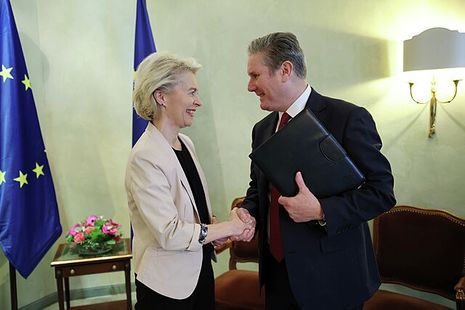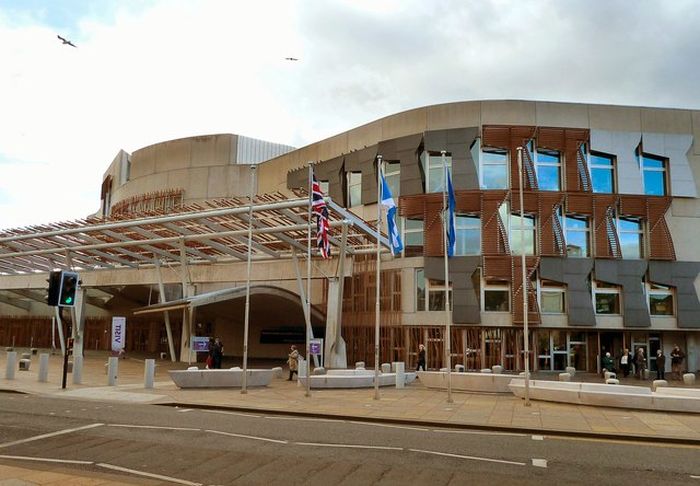Keir Starmer’s ‘New Deal’ era?
Maddie Harding argues that if the government wants to achieve growth, they need a broader economic vision

Keir Starmer is in his New Deal era. But no, not the New Deal era of the 1930s which saw the mass expansion of welfare programmes and large scale government investment in the public sector. Rather, Starmer’s new deal involves the signing of nominally positive trade agreements with the US, India, and EU. These deals will have a minimal impact, and are incredibly limited in scope, yet more importantly, they are representative of Starmer’s failure to find a broader vision for the economic revitalisation the UK desperately needs.
The deals form no broader narrative of redistribution, nor do they promise to improve our public services. They are not part of any clearly defined vision for growth that the public can get behind. And like so much of the government’s policy, these deals are stand-alone and technocratic, lacking any political framing or broader ideological impetus. In a world in which the UK has to reckon with the fact that we are no longer the economic power we once were – with Brexit having cut us off from our largest trading partner and inflected untold damage on our economy – the government cannot depend on lukewarm trade deals to deliver the change that Britain needs.
“People need to feel action and opportunity”
Labour has estimated that these new deals will benefit manufacturing in Cambridgeshire and Peterborough by delivering ‘long term certainty’ for 16% of jobs in the region. People employed in agriculture will benefit from a reduction in checks and red tape following the EU deal, while reduced tariffs on medical licences in the India deal will accordingly help create opportunities in life sciences. Whilst these gains are positive, they are fringe. The EU trade deal will add just 0.2% to our GDP. The US trade deal puts us on worse terms than before Trump introduced tariffs. And they do nothing to actually redistribute wealth from large corporations to the people working day-to-day on the farms, or in the life sciences industries. The government was not elected only to marginally increase prosperity, but to address the discrepancy between those who create this prosperity, and those who benefit from it. While they might be a step in the right direction to achieving ‘growth’, these deals are far from the transformative agenda that Starmer might learn from.
Roosevelt’s ‘New Deal’ provides an alternative model for the growth and redistribution that the country so badly needs. Upon his election, Roosevelt surrounded himself with policy experts in order to establish new government agencies to deal with unemployment and poverty, whilst radically expanding the welfare state to provide social security and relief to the poor. The New Deal initiated vast infrastructure projects and national regeneration, whilst restoring confidence in the banks.
Most importantly, however, the New Deal felt exciting – it felt radical. Roosevelt promised ‘action, and action now’. Keir Starmer has promised pragmatism, and pragmatism now. And whilst pragmatism is often important, this should not mean directionless government. Pragmatism does not mean caution. Incremental changes through half formed trade deals, cutting budgets by slashing disability payments and winter fuel allowances, alienating investors by raising employers’ national insurance contributions – these are not the actions of a radical government. Nor are they a considered platform for change. If Keir Starmer wants a model, then he has it in the wholescale change of Roosevelt’s New Deal and the vast levels of public investment which the current government could emulate.
“Pragmatism does not mean caution”
Keir Starmer has a golden opportunity – in a political climate dominated by populists, the British people gave a progressive party the rare chance to completely reimagine our economy and welfare state. So instead of talking of economic woes, of turning policy decisions into picking the least bad option, the government must create a cohesive, exciting plan which inspires national confidence.
The government frames their policy in terms of making ‘hard choices’ and yet are surprised when people are completely uninspired. But there need not be anything hard about choosing a radical reform platform. Voters can support tax increases if there is a vision to build and grow Britain beyond simply planning reform here, and workers rights bills there. In many ways, politics is largely about perception, so first and foremost people need to feel action and opportunity. They need to feel hope.
New Deal liberalism, not half-formed trade deals, provides this framework for hope. Instead of casting the political climate as one of doom and gloom, the government can frame it as one of regenerative opportunity. Trade deals are important, yes, but they will make minimal change. They are not the solution that Starmer promises they will be, and they are not supported by any broader narrative of change. With Reform UK on the rise, it is more critical than ever that the government provides a package for the future which delivers tangible benefits to the British people.
A ‘deal’ can be many things: it can involve the US, EU, and India or it can involve Franklin Roosevelt. It can be formulated in 2025, or formulated in 1933. Ultimately, however, a deal is a form of exchange. There is little exchange of value from the government to the British people at present. Alongside trade deals, we need a transformative agenda of exchange to revitalise our public services and economy. We need action, and action now.
 News / Colleges charge different rents for the same Castle Street accommodation2 March 2026
News / Colleges charge different rents for the same Castle Street accommodation2 March 2026 News / News in Brief: waterworks, wine woes, and workplace wins 1 March 2026
News / News in Brief: waterworks, wine woes, and workplace wins 1 March 2026 News / Climate activists protest for ‘ethical careers policy’1 March 2026
News / Climate activists protest for ‘ethical careers policy’1 March 2026 News / Angela Merkel among Cambridge honorary degree nominees27 February 2026
News / Angela Merkel among Cambridge honorary degree nominees27 February 2026 News / Private school teacher who lied about Cambridge degree barred from teaching27 February 2026
News / Private school teacher who lied about Cambridge degree barred from teaching27 February 2026









